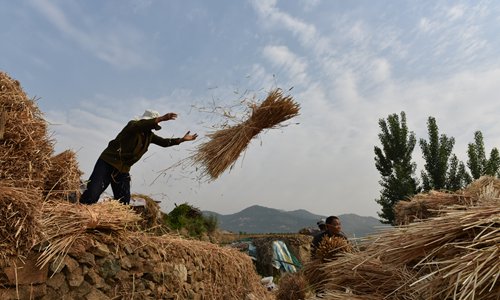Chinese officials mobilized for grassroots poverty alleviation

A farmer tosses a bundle of wheat in Rizhao, East China's Shandong Province on Tuesday. Photo: IC
"If you cannot help us fix the road, then don't bother us again," Li Chaoyang was told during his first visit to Hekou in East China's Anhui Province.
A provincial civil servant, Li has been serving as a village Party secretary since 2014, and Hekou was his second posting.
In early 2015, the Communist Party of China (CPC) launched a program to send tens of thousands of officials down to the countryside to improve rural governance and aid in poverty relief.
Their postings ranged from one to three years. Assisted by local village committees, poverty relief offices and agricultural bureaus, they learned rural work principles and built relationships with local residents.
China has set a target to eradicate poverty by 2020, but it is an arduous task given that 43.35 million people remained living in poverty in the country at the end of last year.
With 141 of the village's 432 households living under the national poverty line, Li faced an enormous workload. Fixing the road was merely his first endeavor.
His hard work began to pay off when the province approved a subsidized road construction project. Seeing the new road being laid, the villagers began to have faith in Li.
'Can you make it?'
Li's second battle to win over residents' trust was introducing a photovoltaic power generation project to raise incomes.
At first some villagers were skeptical about how sunlight could make money. But now the families that take part earn 3,000 yuan ($439) each year by selling solar power to the government.
Over the last two years, Li has encouraged villagers to form various cooperatives to put their knowledge and hard work to good use in various areas, for example cultivating edible mushrooms, planting tea and raising cattle.
"I feel my life has bright prospects and the direction towards prosperity is now clear," said Ma Hongxi, 61, a member of the mushroom cooperative.
Li's experience was echoed by Ma Guoze, an official with the Heilongjiang provincial government in Northeast China.
After arriving in poverty-stricken Linsheng, Ma immediately summoned a Party meeting, but suspicion was waiting for him.
"At first, no one believed in him. How can a nerd from the city know anything about rural areas?" Gong Wanfu, a local CPC member in his seventies recalled his first impression of Ma.
However, Ma achieved some progress and slowly gained the villagers' trust and respect. Ma organized projects to widen roads, install street lights and develop greenhouses. Each household was able to earn an extra 1,500 yuan each year through innovations in land rent policies.
Give help precisely
From 2013 to 2016, the national population living below the poverty line has decreased by 10 million annually, and the officials working in some 128,000 villages nationwide have played a vital role.
Though Dasendian in North China's Hebei Province was lifted out of poverty as a whole in 2015, there were four households that still relied on subsidies for the "five guarantees," (childless elderly who are guaranteed food, clothing, medical care, housing and burial expenses), and 14 households subsisting on the minimum wage.
Hou Fang, Tong Jiqiang and Zheng Hongshan, three employees of the Qinhuangdao Association for Science and Technology, were stationed in the village in February 2016. "First, we had to discover the underlying problem, then we could help those in need," said Hou.
Because the villagers were worried about poverty caused by illness or disease, three clinics were opened to treat patients free of charge. Hou and two other colleagues also organized experts from the city to give public lectures on horticulture. They also visited households to find ways to alleviate their specific difficulties.
Stay and do more
Although his current posting was due to end in October, Li has applied to stay in the village for another term rather than returning to the city. He said his work is a race against time and he wants to fulfill all of his tasks.
"Though I've tasted bitterness and sorrow during the past years as a village official, I am fulfilled because I think my work is really making a difference," Li said.
Hou's posting was for two years, while Tong and Zheng were posted for one year. All three have volunteered to stay. They have undertaken a diverse range of tasks, including applying for industry projects, mediating disputes and mountain patrols.
"If I see any smoke, I rush to the site because the mountains are covered in fruit trees," said Tong Jiqiang, "Even a small fire could destroy the hopes of the whole village."
Newspaper headline: Rural relief
Your Comment
Name E-mailRelated News
-
;
Based in Lhasa, Tibet Vista is a Tibet travel agency that specialized in Tibet permit, and Tibet tours for both private and group travelers at a local price!
•4 Days Lhasa City Group Tour from USD 460 •8 Days Everest Base Camp Group Tour from USD 850 •15 Days Mt.Kailash Group Tour from USD 1780 •2016 Tibet Train Tours from Beijing, Shanghai, Chengdu, Xining,etc










